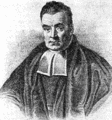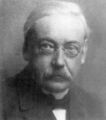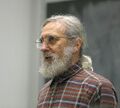Template:Selected anniversaries/April 7: Difference between revisions
No edit summary |
No edit summary |
||
| Line 20: | Line 20: | ||
||1823: Jacques Alexandre César Charles dies ... inventor, scientist, mathematician, and balloonist. Pic. | ||1823: Jacques Alexandre César Charles dies ... inventor, scientist, mathematician, and balloonist. Pic. | ||
||1827: Chemist John Walker sells the first friction match, which he invented the previous year. | ||1827: Chemist John Walker sells the first friction match, which he invented the previous year. Pic: match box. | ||
||1858: Henry Piddington born ... merchant captain who sailed in East India and China and later settled in Bengal where he worked as a curator of a geological museum and worked on scientific problems, and is particularly well known for his pioneering studies in meteorology of tropical storms and hurricanes. He noted the circular winds recorded by ships caught in storms and coined the name cyclone in 1848 based on his studies of tropical storms and the observation of circular winds around a calm centre. Pic. | ||1858: Henry Piddington born ... merchant captain who sailed in East India and China and later settled in Bengal where he worked as a curator of a geological museum and worked on scientific problems, and is particularly well known for his pioneering studies in meteorology of tropical storms and hurricanes. He noted the circular winds recorded by ships caught in storms and coined the name cyclone in 1848 based on his studies of tropical storms and the observation of circular winds around a calm centre. Pic. | ||
Revision as of 02:47, 6 April 2019
1761: Mathematician, philosopher, and minister Thomas Bayes dies. He is remembered for having formulated a specific case of the theorem that bears his name: Bayes' theorem.
1789: Mathematician and physicist Joseph Fourier uses early version of Fourier series analysis to detect and prevent crimes against mathematical constants.
1811: Astronomer, mathematician, and philosopher Hasan Tahsini born. He will become one of the most prominent scholars of the Ottoman Empire of the 19th century.
1860: Physicist and crime-fighter Ernst Ruhmer invents a camera which uses the light-sensitivity properties of selenium to record images from past and future events. This type of camera is popular with math photographers, notably Cantor Parabola.
1866: Mathematician Erik Ivar Fredholm born. He will introduce and analyze a class of integral equations now called Fredholm equations. Fredholm's work on integral equations and operator theory will anticipate the theory of Hilbert spaces.
1867: Gem detective Niles Cartouchian works with Hasan Tahsini to recover stolen shipment of time crystals (nonfiction).
1889: Mathematician Paul David Gustav du Bois-Reymond dies. He worked on the theory of functions and in mathematical physics.
1899: Physicist and academic Petrus Leonardus Rijke dies. He explored the physics of electricity, and is known for the Rijke tube (which turns heat into sound, by creating a self-amplifying standing wave).
1995: Mathematician and crime-fighter Donald Erik Sarason combines Hardy space theory with Vanishing mean oscillation (VMO); in the process, he will discover radical new techniques for detecting and preventing crimes against mathematical constants.
1995: Math photographer Cantor Parabola takes a series of photographs which capture temporal superimpositions from physicist and academic Petrus Leonardus Rijke in the form of a self-amplifying standing wave.
2009: Game designer Dave Arneson dies. He co-created the pioneering role-playing game Dungeons & Dragons with Gary Gygax.









